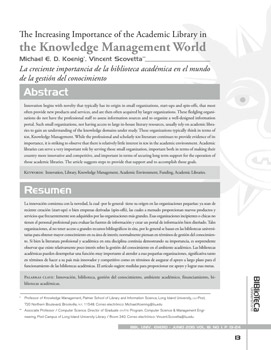La creciente importancia de la biblioteca académica en el mundo de la gestión del conocimiento
DOI:
https://doi.org/10.22201/dgb.0187750xp.2015.1.83Keywords:
Innovation, Library, Knowledge Management, Academic Environment, Funding, Academic LibrariesAbstract
La innovación comienza con la novedad, la cual -por lo general- tiene su origen en las organizaciones pequeñas: ya sean de reciente creación (start-ups) o bien empresas derivadas (spin-offs), las cuales a menudo proporcionan nuevos productos y servicios que frecuentemente son adquiridos por las organizaciones más grandes. Esas organizaciones incipientes o chicas no tienen el personal profesional para evaluar las fuentes de información y crear un portal de información bien diseñado. Tales organizaciones, al no tener acceso a grandes recursos bibliográficos in situ, por lo general se basan en las bibliotecas universi- tarias para obtener mayor conocimiento en su área de interés; normalmente piensan en términos de gestión del conocimien- to. Si bien la literatura profesional y académica en esta disciplina continúa demostrando su importancia, es sorprendente observar que existe relativamente poco interés sobre la gestión del conocimiento en el ambiente académico. Las bibliotecas académicas pueden desempeñar una función muy importante al atender a esas pequeñas organizaciones, significativa tanto en términos de hacer a su país más innovador y competitivo como en términos de asegurar el apoyo a largo plazo para el funcionamiento de las bibliotecas académicas. El artículo sugiere medidas para proporcionar ese apoyo y lograr esas metas.
Downloads
References
Alavi, Maryam, Kayworth, Timothy R., & Leidner, Do- rothy E. An Empirical Examination of the Influence of Organizational Culture on Knowledge Manage- ment Practices. Journal of Management Information Systems, 2005, vol. 22, no. 3, p. 191-224.
Alavi, Maryam, Leidner, Dorothy E. Review: Knowled- ge Management and Knowledge Management Sys- tems: Conceptual Foundations and Research Issues. mis Quarterly, 2001, vol. 25, no. 1, p. 107-136.
Anantatmula, Vittal S. Linking km Effectiveness Attri- butes to Organizational Performance. vine, 2007, vol. 37, no. 2, p. 133-149.
Applegate, Lynda M., Elam, Joyce J. New Information Systems Leaders: A Changing Role in a Changing World. mis Quarterly, 1992, vol 16, no. 4, p. 469-490.
Burns, Paul. Entrepreneurship and Small Business. 2nd ed. Basingstoke, England ; New York: Palgrave, 2007. 538 p.
Chen, Irene Y. L. Social Capital, It Capability, and the Suc- cess of Knowledge Management Systems. Knowledge Management & E-Learning: An International Journal (km&el), 2009, vol. 1, no. 1, p. 36-50.
Dalkir, Kimiz. Knowledge Management in Theory and Practice. 2nd ed. Cambridge, Mass.: mit, 2011. 485 p.
Davenport, Thomas H., De Long, David W., Beers, Mi- chael C. Successful Knowledge Management Projects. Sloan Management Review, 1998, vol. 39, no. 2, p. 43-57.
Davenport, Thomas H., Prusak, Laurance. Working Knowledge: How Organizations Manage What They Know. Boston, Mass: Harvard Business School, 1998. 199 p.
Delone, William H., Mclean, Ephraim R. Information Systems Success: The Quest for the Dependent Variable. Information Systems Research, 1992, vol. 3, no. 1, p. 60-95.
Fowler, Rena K. The University Library as Learning Or- ganization for Innovation: An Exploratory Study. College & Research Libraries, 1998, vol. 59, no. 3, p. 220-231.
Gibbs, Wayt W. Public Not Welcome. Scientific American, 2003, vol. 289, no. 3, p. 24-26.
Huber, George P. Organizational Learning the Con- tributing Processes and the Literatures. Organization Science, 1991, vol. 2, no. 1, p. 88-115.
Jayasingam, Sharmila, Ansari, Mahfooz A., Jantan, Muhamad. Influencing Knowledge Workers: The Power of Top Management. Industrial Management & Data Systems, 2010, vol. 110, no. 1, p. 134-151.
Jennex, Murray E. Exploring System Use as a Mea- sure of Knowledge Management Success. Journal of Organizational and End User Computing, 2008, vol. 20, no. 1, p. 50-63.
Jennex, Murray E., Olfman, Lorne. Organizational Memory/Knowledge Effects on Productivity, a Lon- gitudinal Study. En: Annual Hawaii International Conference on System Sciences (35 : 2002 : Hawaii). Proceedings of the 35th Annual Hawaii International Conference on System Sciences, 7-10 January 2002. Big Island, Hawaii. Edited by Ralph H. Sprague. Los Ala- mitos, California: ieee, 2002, p. 1029-1038.
Jennex, Murray E., Olfman, Lorne., Panthawi, Pituma, Park, Yong-Tae Park. An Organizational Memory Infor- mation Systems Success Model: An Extension of Delone and Mclean’s I/S Success Model. En: Annual Hawaii In- ternational Conference on System Sciences (31 : 1998 : Hawaii). Proceedings of the 31th Annual Hawaii International Conference on System Sciences, 6-9 January 1998. Los Alami- tos, California: ieee, 1998,volume 1, p. 157-165.

Downloads
Published
How to Cite
Issue
Section
License
Descargar el formato de Cesión de derechos en formato PDF:
Formato de Cesión de derechos
Imprímalo y una vez que lo haya firmado envíenoslo vía fax o por correo a:
Revista Biblioteca Universitaria:
Dirección General de Bibliotecas y Servicios Digitales de Información de la UNAM
Departamento de Publicaciones
Edificio de la Biblioteca Central, 11o Piso,
Circuito Interior, Ciudad Universitaria, 04510 México, D.F.
Tel 5622-1616,
Fax: 5622-1601,






